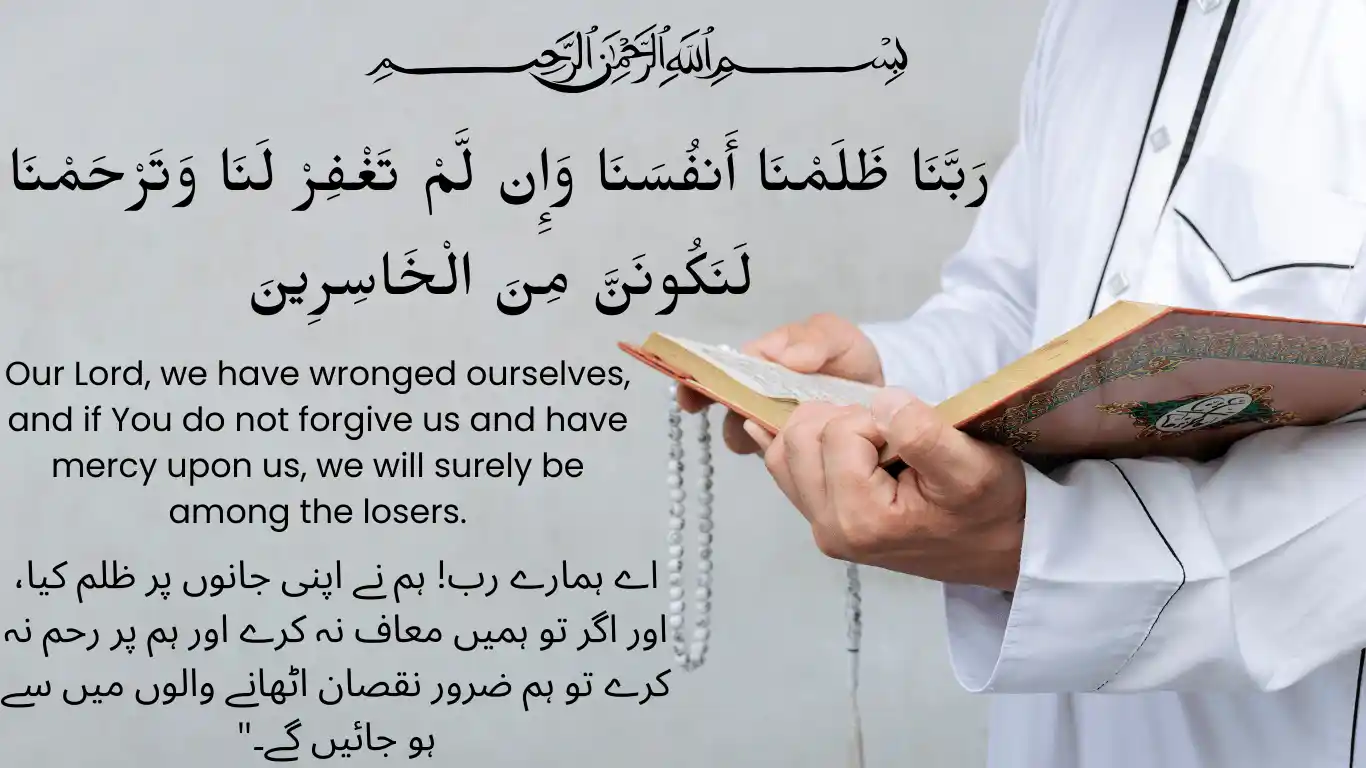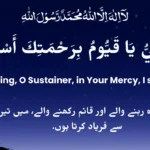The Rabbana Zalamna Anfusana Dua is a profound supplication from the Quran that emphasizes seeking forgiveness and mercy from Allah. This dua, recited by Prophet Adam (AS) and Hawwa (Eve) after their error, holds timeless lessons for humanity. Understanding and incorporating this prayer into our daily lives allows us to seek Allah’s forgiveness and mercy sincerely. Below, we delve into the full Arabic text, Urdu and English translations, its significance, and its relevance for Muslims today.
What is Rabbana Zalamna Anfusana Dua?
The dua is derived from Surah Al-A’raf (7:23) in the Quran. It reflects humility and recognition of one’s errors, making it an essential prayer for seeking forgiveness.
Rabbana Zalamna Anfusana Dua in Arabic
رَبَّنَا ظَلَمْنَا أَنفُسَنَا وَإِن لَّمْ تَغْفِرْ لَنَا وَتَرْحَمْنَا لَنَكُونَنَّ مِنَ الْخَاسِرِينَ
Translation in English
“Our Lord, we have wronged ourselves, and if You do not forgive us and have mercy upon us, we will surely be among the losers.”
Translation in Urdu
“اے ہمارے رب! ہم نے اپنی جانوں پر ظلم کیا، اور اگر تو ہمیں معاف نہ کرے اور ہم پر رحم نہ کرے تو ہم ضرور نقصان اٹھانے والوں میں سے ہو جائیں گے۔”
Significance of Rabbana Zalamna Anfusana Dua
- Repentance: This dua teaches the importance of acknowledging one’s mistakes and turning to Allah for forgiveness.
- Mercy: It emphasizes that Allah’s mercy is the ultimate refuge for humans.
- Lesson in Humility: Recognizing one’s vulnerability and dependence on Allah strengthens faith and humility.
When and How to Recite This Dua
- Daily Reflection: Recite this dua after Salah or during moments of self-reflection to seek Allah’s forgiveness.
- During Difficult Times: When feeling overwhelmed by sins or hardships, this dua reminds us to rely on Allah’s mercy.
- In Tahajjud Prayer: The night prayer is an excellent time to recite this dua, as Allah’s mercy is abundant during the last third of the night.
Lessons from the Story of Prophet Adam (AS)
The Rabbana Zalamna Anfusana Dua originates from the incident where Prophet Adam (AS) and Hawwa ate from the forbidden tree. Despite their mistake, they immediately turned to Allah with sincerity and humility. This teaches us that no matter how grave our sins may seem, Allah’s mercy is always within reach for those who repent.
Benefits of Reciting Rabbana Zalamna Anfusana Dua
- Spiritual Cleansing: Sincerely reciting this dua helps purify the heart from sin and guilt.
- Strengthens Faith: Acknowledging Allah’s mercy and seeking forgiveness deepens one’s connection with Him.
- Protection from Loss: The dua reminds believers of the spiritual and worldly losses that result from ignoring Allah’s mercy.
How to Memorize This Dua
- Break It Into Parts: Learn the dua in smaller sections to simplify memorization.
- Daily Recitation: Practice reciting the dua during Salah or personal prayers.
- Listen to Audio: Use online resources to listen and repeat after the recitation for better pronunciation.
Practical Uses of This Dua in Daily Life
- Self-Accountability: Recite this dua to reflect on your actions and seek forgiveness.
- Parenting: Teach this dua to children as a means of understanding repentance and Allah’s mercy.
- Community Worship: Use it in congregational prayers or Islamic gatherings to instill its lessons in others.
Related Quranic Duas for Forgiveness
- Dua of Yunus (AS): “لَا إِلَهَ إِلَّا أَنتَ سُبْحَانَكَ إِنِّي كُنتُ مِنَ الظَّالِمِينَ” (Surah Al-Anbiya, 21:87)
Translation: “There is no deity except You; exalted are You. Indeed, I have been of the wrongdoers.” - Istighfar (Forgiveness): “أَسْتَغْفِرُ اللّٰهَ رَبِّيْ مِنْ كُلِّ ذَنْبٍ وَّاَتُوْبُ اِلَيْهِ“
Translation: “I seek forgiveness from Allah, my Lord, for every sin, and I repent to Him.”
FAQs:
This dua highlights the importance of acknowledging one’s mistakes, seeking Allah’s forgiveness, and relying on His mercy to avoid spiritual loss.
Yes, this dua can be recited anytime as a means of repentance and reflection on one’s actions.
Use repetition, audio recordings, and storytelling methods to explain the context and meaning behind the dua, making it engaging for children.
Conclusion
The Rabbana Zalamna Anfusana Dua is a powerful reminder of human fallibility and Allah’s boundless mercy. Incorporating this dua into your daily worship strengthens your relationship with Allah, purifies your heart, and provides spiritual solace. Teach it to your family, reflect upon its meaning, and recite it often to reap its immense benefits.
May Allah forgive us, have mercy upon us, and guide us on the path of righteousness. Ameen.




